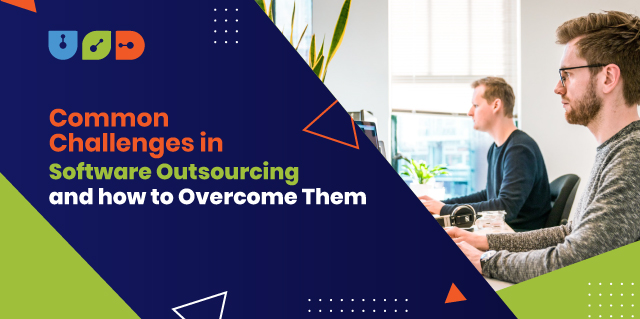Table of Contents
ToggleOutsourcing software development has become a common practice for businesses looking to reduce costs, access specialized skills, and accelerate product development. However, it also presents certain software outsourcing challenges that organizations may encounter during the software development outsourcing process. This article aims to identify these challenges and provide effective solutions to overcome them.
1. Lack of Communication and Misunderstandings
One of the most common software outsourcing challenges is the lack of effective communication between the client and the outsourcing team. Misunderstandings can arise due to language barriers, different communication styles, or a lack of clarity in project requirements.
In order to overcome this challenge, it is crucial to establish clear and open lines of communication from the beginning. Regular video conferences, instant messaging tools, and project management software can facilitate real-time communication and foster better understanding between both parties. Providing detailed documentation and specifications can also help in conveying project requirements accurately.
2. Time Zone Differences
Time zone differences can pose software outsourcing challenges. Working with teams located in different time zones means that there may be limited overlapping working hours, which can lead to delays in communication and project progress. It becomes essential to find a balance that accommodates the working hours of both parties.
In order to address this challenge, project schedules should be planned with overlapping working hours in mind. This ensures that team members have sufficient time for collaboration and problem-solving. Additionally, utilizing project management tools that allow for asynchronous communication and centralized documentation can help overcome time zone challenges.
3. Quality Control and Code Standards
Maintaining consistent code quality and adhering to coding standards is one of the most common software outsourcing challenges. Different teams may have varying levels of expertise and follow different coding practices. This can lead to inconsistencies in the quality of code produced, making it difficult to ensure a unified and standardized approach to custom software development.
In order to overcome this challenge, it is crucial to establish clear coding standards and quality control processes. Regular code reviews, automated testing, and continuous integration practices can help ensure that the code produced meets the required quality standards. Building a strong relationship with the outsourcing team and providing feedback on code quality can also contribute to improving overall software quality.
4. Cultural and Language Barriers
Cultural and language barriers can hinder effective communication and understanding between the client and the outsourcing team. Differences in communication styles, work practices, and business etiquette can create misunderstandings and lead to misaligned expectations. Language barriers may also affect the clarity and accuracy of requirements, potentially impacting the overall quality of the software being developed.

In order to bridge these gaps, it is important to foster a culture of collaboration and mutual respect. Encouraging team members to ask questions, seek clarification, and provide feedback can help overcome cultural and language barriers. Engaging in team-building activities and cultural exchange programs can also enhance understanding and foster stronger working relationships.
5. Security Risks and Intellectual Property Protection
One of the main software outsourcing challenges involves sharing sensitive business information and intellectual property with external teams. Ensuring the security and protection of this data is a significant concern. There is a risk of unauthorized access, data breaches, or misuse of intellectual property by the outsourcing vendor or its employees. Safeguarding confidential information and maintaining data integrity throughout the outsourcing process requires robust security measures and protocols.
To mitigate security risks, organizations should carefully select outsourcing partners with established security measures and protocols in place. Implementing non-disclosure agreements (NDAs) and other legal contracts can help safeguard intellectual property. Regular security audits and monitoring can further enhance data protection.
6. Lack of Project Management Control
Maintaining control over the progress, timelines, and deliverables of an outsourced project can be challenging. Since the development team is located externally, it may be difficult to have direct oversight and real-time monitoring of the project. This lack of project management control can lead to uncertainties regarding task completion, milestone achievements, and overall project progress.
In order to address this challenge, it is important to establish a robust project management framework. Clearly defining project milestones, deliverables, and timelines can provide greater visibility and control. Regular progress updates, status meetings, and project management tools can also help monitor and track project progress effectively.
7. Hidden Costs and Budget Overruns
Unforeseen expenses and budget overruns can occur during the software outsourcing process. Hidden costs may arise due to factors such as additional scope, change requests, or unanticipated technical complexities. Inaccurate cost estimation or inadequate budget planning can result in financial challenges for organizations, impacting the overall success of the outsourcing engagement.
In order to manage costs effectively, it is essential to conduct thorough research and due diligence while selecting an outsourcing vendor. Clearly define the project scope and budget, and include provisions for contingencies. Regular monitoring and tracking of expenses can help identify potential budget overruns early on, enabling corrective measures to be taken.
8. Vendor Reliability and Trustworthiness
Choosing a reliable and trustworthy outsourcing vendor is crucial for the success of software development projects, whether it is as basic as a web app development or mobile app development project. However, assessing the reliability and trustworthiness of a vendor can be challenging. Lack of vendor reliability can result in missed deadlines, poor-quality deliverables, or even project failure. Building trust and ensuring the vendor’s commitment to project success is essential but may require thorough evaluation and due diligence.
To ensure vendor reliability, conduct a thorough assessment of potential vendors. Keep track of their reputation in the industry along with the testimonials from their clients. Engage in detailed discussions to assess their technical expertise, communication skills, and commitment to project success. Performing a pilot project or proof of concept can also help validate their capabilities.
9. Staff Turnover and Team Stability
Staff turnover within the outsourcing team can disrupt project continuity and impact overall productivity. Continually changing team members can lead to delays, loss of knowledge, and reduced efficiency. Maintaining team stability and minimizing staff turnover is crucial for ensuring a consistent and smooth development process.
In order to address this challenge, it is important to seek vendors with a stable and experienced team. Inquire about their employee retention rates and measures taken to ensure team stability. Building strong relationships with the team members and providing opportunities for professional growth can also contribute to higher employee satisfaction and retention.
10. Lack of Domain Expertise
Outsourcing software development to a team lacking domain expertise can pose software outsourcing challenges. Inadequate knowledge of the specific industry or business domain can lead to suboptimal solutions that do not fully meet the requirements. Without a deep understanding of the domain, the outsourcing team may struggle to grasp the nuances and complexities of the project, potentially affecting the quality and effectiveness of the software being developed. In intricate projects such as machine learning and AI development, the absence of domain expertise can have severe consequences, potentially resulting in the complete failure of the project.
To overcome this challenge, thoroughly assess the technical expertise and domain knowledge of potential outsourcing vendors. Request case studies, project portfolios, and references related to your industry. Collaborate closely with the outsourcing team to provide detailed insights into your business domain and requirements.
11. Collaboration and Teamwork
Effective collaboration and teamwork between the client and the outsourcing team are crucial for project success. However, collaboration can be challenging when working with an external team. Differences in work practices, communication styles, and cultural norms can create barriers to seamless collaboration and hinder the synergy required for successful software development.
To foster collaboration, establish clear channels for communication, and encourage regular interactions between team members. Utilize collaboration tools, such as shared document repositories and project management software, to facilitate seamless teamwork. Regularly engage in status updates, feedback sessions, and joint decision-making processes.
12. Managing Expectations
Managing expectations is essential to ensure a smooth outsourcing experience. However, aligning expectations can be one of the prominent software outsourcing challenges, especially when there are cultural and communication differences between the client and the outsourcing team. Misaligned expectations regarding project scope, timelines, and deliverables can lead to dissatisfaction, conflicts, and delays in project execution.
To manage expectations effectively, establish realistic project goals, and communicate them clearly to all stakeholders. Provide regular progress updates and involve stakeholders in decision-making processes. Transparent and proactive communication can help align expectations and build trust among all parties involved.
13. Lack of Flexibility and Adaptability
The outsourcing process may require adjustments and flexibility to accommodate changing requirements, market dynamics, or business priorities. A lack of flexibility can hinder project progress and limit the ability to respond to evolving needs.
To overcome this challenge, foster a culture of flexibility and adaptability within the outsourcing team. Encourage open discussions about changes and provide mechanisms to incorporate them smoothly into the project plan. Regularly assess and reassess project requirements to identify potential areas for improvement or modification.
14. Maintaining Long-term Relationships
Building and maintaining long-term relationships with outsourcing vendors can be one of the most common software outsourcing challenges. However, it can provide numerous benefits, including improved collaboration, a better understanding of business needs, and cost efficiencies.
To foster long-term relationships, prioritize effective communication, trust-building, and mutual respect. Regularly evaluate the performance of the outsourcing vendor and provide constructive feedback. Offer opportunities for professional growth and skill development within the outsourcing team. Celebrate shared successes and milestones to strengthen the bond between both parties.
Strategies to Overcome Software Outsourcing Challenges
To overcome the software outsourcing challenges mentioned above, consider implementing the following strategies:
- Keep the communication clear and open.
- Plan project schedules with overlapping working hours in mind.
- Define coding standards and implement quality control processes.
- Establish a collaborative work culture on mutual respect
- Implement security measures and protect intellectual property.
- Establish a robust project management framework.
- Conduct thorough research and due diligence while selecting outsourcing vendors.
- Monitor and track expenses regularly to manage costs effectively.
- Choose reliable and trustworthy outsourcing vendors.
- Seek vendors with stable and experienced teams.
- Thoroughly assess the technical expertise and domain knowledge of vendors.
- Encourage effective collaboration and teamwork.
- Set clear expectations with transparent communication.
- Embrace flexibility and adaptability to accommodate changes.
- Nurture long-term relationships through effective communication and trust-building.
By implementing these strategies, businesses can overcome the common software outsourcing challenges and ensure successful outcomes.
Final Thoughts
Software outsourcing offers numerous benefits but comes with its own set of challenges. Lack of communication, time zone differences, quality control issues, cultural and language barriers, security risks, and vendor reliability are some of the common software outsourcing challenges. However, by implementing effective strategies such as establishing clear communication channels, defining coding standards, fostering collaboration, and selecting reliable vendors, these software outsourcing challenges can be overcome. It is crucial to prioritize proactive and transparent communication, manage expectations, and nurture long-term relationships to achieve successful software outsourcing partnerships.
FAQs
Q1: How can I overcome the challenge of time zone differences in software outsourcing?
A: To address time zone differences, plan project schedules with overlapping working hours in mind. Utilize project management tools that allow for asynchronous communication and centralized documentation.
Q2: What steps can I take to protect my intellectual property when outsourcing software development?
A: Implement non-disclosure agreements (NDAs) and other legal contracts. Choose outsourcing vendors with established security measures and protocols in place. Conduct regular security audits and monitoring.
Q3: How can I ensure quality control in software outsourcing?
A: Define coding standards, conduct regular code reviews, and implement automated testing and continuous integration practices. Provide feedback on code quality and foster a strong relationship with the outsourcing team.
Q4: What should I consider when selecting an outsourcing vendor?
A: Evaluate their track record, client testimonials, and industry reputation. Assess their technical expertise, communication skills, and commitment to project success. Consider performing a pilot project or proof of concept.
Q5: How can I foster long-term relationships with outsourcing vendors?
A: Prioritize effective communication, trust-building, and mutual respect. Provide opportunities for professional growth and skill development within the outsourcing team. Celebrate shared successes and milestones.










